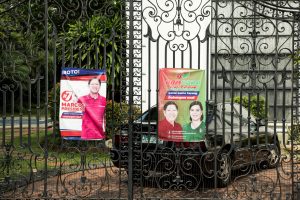Philippine President Ferdinand Marcos Jr. signed the 2025 national budget with a provision for the “conditional implementation” of some items, including a controversial “ayuda” (aid) program for the poor.
“This way we ensure that its implementation will be strategic leading to the long-term improvement of the lives of qualified beneficiaries, while guarding against misuse, and duplication, and fragmented benefits,” Marcos said. “This approach is anchored on a simple yet profound truth: the appropriation of public funds must not break the public trust,” he added.
The president’s statement addresses the concerns raised by anti-corruption stakeholders about how government funds intended to provide relief to vulnerable segments of the population are being used by politicians to boost their candidacies ahead of this year’s midterm elections.
To “insulate” the program from “any form of political interference,” Marcos directed the Department of Social Welfare and Development (DSWD) to take the lead in the non-partisan distribution of funds. For its part, the DSWD vowed to adopt “more stringent measures that will pacify the fears of our taxpayers that their money will be used for politics.” It recently announced the banning of election candidates from the agency’s payout activities.
The Marcos government made these adjustments to appease rising outrage over the bloated allocation for “ayuda” funds while the budget of key social service departments was slashed. Critics contend that the “ayuda” program has been politicized by allowing politicians to identify beneficiaries. The opposition pointed out that allies of the ruling party received bigger “ayuda” funds. The program designed to alleviate the conditions of the poor has become a pork barrel tool for those in power.
The controversy surrounding the “ayuda” program reflects the persistence of political patronage in the country. Access to financial and medical aid is facilitated by elected officials instead of making this available to all who are qualified and really in need of state assistance. Worse, this type of program is prone to corruption, which forced previous governments to abolish pork barrel allocations. But it is a convenient tool for rewarding party members and allies which is why it is often inserted in the annual budget and revived under new names.
The conflict between the Marcos and Duterte clans and their allies is also about the uneven distribution of the “ayuda” budget within the ruling coalition. The reduced budget of Vice President Sara Duterte will not prevent her from fulfilling her constitutional mandate but she now has less funds for her “ayuda” programs. The two chambers of Congress initially clashed on the increased “ayuda” allocation but they agreed to pass the 2025 budget bill when a compromise was made on how the funds would be divided by legislators.
Marcos may appear to be skeptical over the use of “ayuda” by politicians but his office has the biggest pork barrel allocation in the 2025 budget. He can also use his confidential and intelligence funds with less oversight and scrutiny from Congress.
Several anti-corruption protests are scheduled this month in response to the passage of the national budget. Marcos and his allies should do more than make token gestures by removing pork barrel programs from the budget. He should remember how public anger against cronyism and corruption was among the key factors that led to the People Power uprising in 1986. The rise of an anti-corruption movement also deposed another president in 2001. Hundreds of thousands of citizens trooped to the streets denouncing corruption and pork barrel in 2008 and 2013. Despite lacking credibility, the Dutertes have railed against the rising debt and fund misuse of the Marcos government.
Aside from the protests, the election campaign which starts next month will also be an opportunity for opposition forces to highlight the pork barrel issue. There are proposals for Congress to pass a supplemental budget to correct the infirm provisions and realign funding items in favor of social services.
It is unfortunate that “ayuda” has earned a negative connotation when it is an emergency lifeline that could make a difference in the lives of many. Banning politicians from “ayuda” distribution is a step forward but the more crucial action is for the government to come up with a holistic approach to develop the economy to solve poverty instead of relying on cash distribution schemes.

































